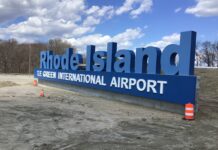The chef laughed as he read the label. “Organic Salad Greens,” it read. The container was made of plastic.
Chefs and restaurateurs in Rhode Island who strive to have a menu based on sustainable ingredients from local farms do not have an easy task. The growing season is short, and supply is limited.
“Our policy is to serve the best of what is seasonally available,” says chef Joe Hafner of Gracie’s in Providence. “But we have a three-month growing season in Rhode Island. We are not living in Southern California or Europe, where it is possible to have everything on the menu come from 30 miles away the kitchen. We make every effort to be sure that everything on our menu comes from growers, farmers and fishermen taking care of the land and sea.”
Hafner has constant conversations with chef colleagues about the issue. He says, “We think we have a responsibility to offer what is fresh and local.” He utilizes local growers such as Eva’s Garden, an herb farm in southeastern Massachusetts, and Urban Edge Farm in Cranston. This time of year, sourcing local ingredients is much easier, but once fall and winter set in, what then? Does a restaurateur have to choose between compromising principles or closing down?
Hafner is forthright about what he does. “If I can get an heirloom tomato that tastes better and looks better and it happens to have been grown in Canada or California, is that a problem? Just because it’s local does not make it better. If I’m buying onions to make a stock, I may not go for the local produce and its higher price. I’m going for quality. If the quality is there and it happens to be grown farther away, I’m buying it.”
This real-world philosophy is shared by Brian Kingsford, owner and executive chef of the recently opened Bacaro restaurant on the Providence waterfront. “[Local] farms are small,” he says. “Growers have to maintain their farmstand business and may not produce enough to supply restaurants. So we have to go elsewhere. If I buy a tomato from New Jersey that was grown under proper conditions, what is wrong with that?”
Both these chefs have reputations for the utmost quality and care in what they serve. However, it seems as though one always has to justify one’s beliefs in this arena.
Kingsford declared at the start of our interview, “I have always been about sustainable [practices]. We focus on indigenous ingredients. Mother Nature guides my hand.” He personally visits local farms such as Confreda Farms in Cranston and Warwick and Four Town Farm in Swansea every day to hand-pick fresh produce for his menu.
“This is not the same as shopping at the farmers’ market,” he says. “This is what having a relationship with a grower is all about.”
The utopian ideal of a strictly local or regional menu may be just that. Supply and demand play a role in this, but there are other factors. For example, what little meat is raised in Rhode Island is not sold commercially. Hafner serves an organic beef from Maine that is not readily available right now. And both chefs had anecdotes of pressure being brought to bear on small producers who wanted to bypass wholesalers and sell directly to their restaurants.
But we live in the Ocean State, so it would appear that seafood would be in ample supply. Again, seasonality plays a part. The chefs are expert at sourcing fresh-caught offerings from the local waters. At Gracie’s, Hafner is putting black bass, striped bass and cod on his menu, while Kingsford is looking forward to fresh flounder to prepare at Bacaro.
But Kingsford also has an interesting perspective on one local delicacy. He says – and most would agree – that Rhode Island littleneck clams are among the best in the country. Yet the majority of the local littleneck harvest is shipped out of state.
These days, there is a lot of talk about being environmentally aware, being green, saving the planet. As these businesspeople demonstrate daily, it takes real work to put talk into practice. They deserve our admiration and support. •
Dining Out with Bruce Newbury can be heard on Talk Radio 920 WHJJ-AM Fridays at 6 p.m. and Saturdays at noon. He can be contacted at bruce@brucenewbury.com.












